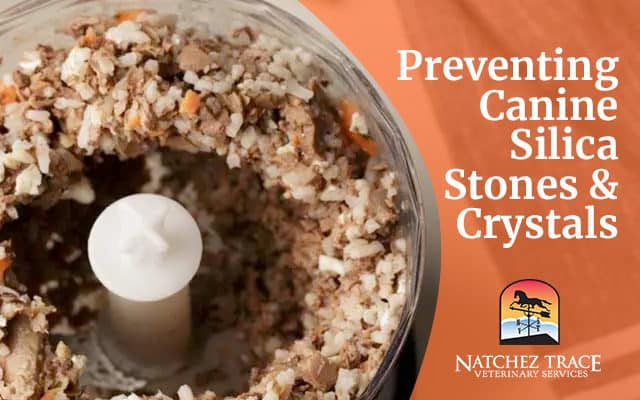When a dog suffers from urinary stones or crystals, the most common forms are calcium oxalate and struvite.
Sometimes, however, a dog will suffer from silica crystals and stones.
Silica bladder stones comprise a mere 3-14% of all urinary stones so not too many and not near as common as struvite or calcium oxalate.
According to the Minnesota Urolith Center,
Available clinical data provides a strong link between canine silica uroliths and consumption of specific dietary ingredients. Diets that contain substantial quantities of corn gluten feed or grain hulls are especially suspect. Water in volcanic areas has also been implicated in the formation of silica uroliths. The inert ingredient in some tablet medications and antacids is silica.
Two Simple Steps to Minimize Canine Silica Stones
You can take steps at home to prevent the formation or recurrence of silica stones and crystals:
1. Check Your Dog’s Supplements and Medications
Investigate!
Read your labels, check for active or inactive ingredients in medications and vitamin/mineral supplements.
Look specifically for silica. If detected, select alternatives without silica.
Antacids are common sources of silica
2. Avoid Certain Homeopathic Medicines
Just like with supplements and medications, check your labels for ingredients.
Most homeopathic ingredient labels are written in Latin. You may have to look up each ingredient online to make sure it doesn’t contain silica.
Avoid homeopathic remedies touted for the relief of a variety of illnesses.
Feeding to Prevent Canine Silica Stones & Crystals
Certain natural diets also contain silica. Diets containing substantial corn gluten feed (not corn gluten meal), or intact grains (with hulls) often contain silica. Always read your labels!
The following is a list of foods known to contain silica. Avoid all foods on this list:
- Bell peppers
- Soybeans
- Oats
- Brown rice
- Barley
- Burdock root
- Apples
- Oranges
- Raisins
- Grapes
- Cucumber
- Hemp leaves
- Horsetail
- Marjoram
- Spinach
- Radish
- Romaine lettuce
- Tomato
- Nopal cactus
- Peanuts
- Almonds
- Millet
- Flaxseeds.
And don’t let your dog eat grasses, woody plants, and dirt. Silica uroliths are common in range cattle and sheep that consume forage grasses, which have a high concentration of silica.
Avoid using antacids containing magnesium trisilicate.
Be cautious using dietary supplements, homeopathic remedies, and medicines containing silica. Always read the ingredient label!
Be Proactive Using a Home-Cooked Diet
High moisture foods (wet or home-cooked) are effective because the additional water consumed from the wet food is associated with decreased urine concentrations of certain minerals.
Provide high-quality foods containing moderate quantities of animal protein and lower quantities of vegetables.
Avoid all high-silica foods on the above list.
If you want to be very proactive, try a TCVM (Traditional Chinese Veterinary Medicine) Dog Food Recipe from the PET | TAO website.
Follow the instructions on the page. Make sure to look at the Food Chart for Dogs to choose the appropriate diet for your dog.
Then, select the recommended recipe. When making the recipe, simply avoid using any of the ingredients on the high-silica list above.
Most dogs thrive on a home-cooked diet and love the flavor.
I wish you and your dog the best, and hope my information helps you resolve your dog’s silica stones!








